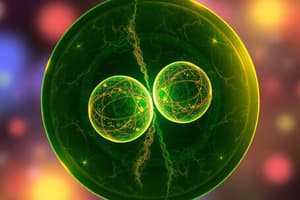Podcast
Questions and Answers
Why do some species employ both mitosis and meiosis, whereas other species use only mitosis?
Why do some species employ both mitosis and meiosis, whereas other species use only mitosis?
They need both if they are producing animal gametes. The form of cell division that produces animal gametes is meiosis, not mitosis. The production of gametes in plants is a function of both mitosis and meiosis.
DNA replication produces two identical DNA molecules, called _________.
DNA replication produces two identical DNA molecules, called _________.
sister chromatid(s)
After chromosomes condense, the __________ is the region where the identical DNA molecules are most tightly attached to each other.
After chromosomes condense, the __________ is the region where the identical DNA molecules are most tightly attached to each other.
centromere(s)
During mitosis, microtubules attach to chromosomes at the ________.
During mitosis, microtubules attach to chromosomes at the ________.
In dividing cells, most of the cell's growth occurs during ________.
In dividing cells, most of the cell's growth occurs during ________.
The ______________ is a cell structure consisting of microtubules, which forms during early mitosis and plays a role in cell division.
The ______________ is a cell structure consisting of microtubules, which forms during early mitosis and plays a role in cell division.
During interphase, most of the nucleus is filled with a complex of DNA and protein in a dispersed form called ____________.
During interphase, most of the nucleus is filled with a complex of DNA and protein in a dispersed form called ____________.
In most eukaryotes, division of the nucleus is followed by ___________.
In most eukaryotes, division of the nucleus is followed by ___________.
The _________ are the organizing centers for microtubules involved in separating chromosomes during mitosis.
The _________ are the organizing centers for microtubules involved in separating chromosomes during mitosis.
Are sister chromatids present in all or part of this phase?
Are sister chromatids present in all or part of this phase?
Is the DNA condensed in all or part of this phase?
Is the DNA condensed in all or part of this phase?
Does the cell contain twice as much DNA in this phase as it did in the G1 phase?
Does the cell contain twice as much DNA in this phase as it did in the G1 phase?
What occurs during prophase?
What occurs during prophase?
What occurs during prometaphase?
What occurs during prometaphase?
What occurs during metaphase?
What occurs during metaphase?
What occurs during anaphase?
What occurs during anaphase?
What occurs during telophase?
What occurs during telophase?
During prophase, the microtubules of the mitotic spindle ________.
During prophase, the microtubules of the mitotic spindle ________.
During anaphase, the nonkinetochore microtubules ______ and move past each other, and the kinetochore microtubules ________.
During anaphase, the nonkinetochore microtubules ______ and move past each other, and the kinetochore microtubules ________.
During telophase, the nonkinetochore microtubules ________.
During telophase, the nonkinetochore microtubules ________.
Which of the following does NOT occur during mitosis?
Which of the following does NOT occur during mitosis?
If there are 20 duplicated chromosomes in a cell, how many centromeres are there?
If there are 20 duplicated chromosomes in a cell, how many centromeres are there?
Cells will usually divide if they receive the proper signal at a checkpoint in which phase of the cell cycle?
Cells will usually divide if they receive the proper signal at a checkpoint in which phase of the cell cycle?
How would Cytochalasin B interfere with cell division?
How would Cytochalasin B interfere with cell division?
Bacteria ONLY: Chromosome separation begins at the origin of replication on DNA.
Bacteria ONLY: Chromosome separation begins at the origin of replication on DNA.
Eukaryotes ONLY: Before separation, duplicated chromosomes condense.
Eukaryotes ONLY: Before separation, duplicated chromosomes condense.
Which of the following statements are true of cytokinesis in plant cells?
Which of the following statements are true of cytokinesis in plant cells?
Cells divide by construction of a ring of protein.
Cells divide by construction of a ring of protein.
The presence of a cell wall prevents the cell from dividing by constriction.
The presence of a cell wall prevents the cell from dividing by constriction.
Tubulin or tubulin-like molecules function in binary fission (in bacteria) or cytokinesis (in animals and plants)
Tubulin or tubulin-like molecules function in binary fission (in bacteria) or cytokinesis (in animals and plants)
Study Notes
Cell Division and Reproduction
- Some species utilize both mitosis and meiosis for reproductive processes, particularly in animals.
- Meiosis is essential for producing gametes, while both mitosis and meiosis are involved in plant reproduction.
Chromosomes and Mitosis
- DNA replication results in two identical DNA molecules known as sister chromatids, separated during mitosis.
- The centromere is the region where sister chromatids are tightly attached.
- Microtubules attach to chromosomes at kinetochores during mitosis.
Cell Cycle Phases
- Most cell growth occurs during interphase, which includes G1, S, and G2 phases.
- During S phase, DNA is replicated, leading to twice the amount of DNA present in G1.
- In G2 phase, the cell prepares for mitosis but the DNA is not yet condensed.
Mitosis Process
- The mitotic spindle is formed from microtubules during early mitosis and is crucial for chromosome separation.
- Chromatin, a complex of DNA and protein, is present in the nucleus during interphase.
- Cytokinesis follows the division of the nucleus in eukaryotes, completing the cell division process.
Mitosis Stages
- Prophase: Tubulin assembles into spindle microtubules; sister chromatids are joined by cohesins.
- Prometaphase: Nuclear envelope fragments; microtubules attach to kinetochores.
- Metaphase: Chromosomes align along the metaphase plate; kinetochores remain motionless relative to cell poles.
- Anaphase: Cohesin proteins are cleaved; sister chromatids are pulled apart toward cell poles.
- Telophase: Spindle microtubules disassemble; nuclear envelopes form around daughter nuclei.
Microtubule Dynamics
- During prophase, microtubules of the mitotic spindle lengthen.
- Nonkinetochore microtubules lengthen and move past each other during anaphase, while kinetochore microtubules shorten.
- Nonkinetochore microtubules disassemble during telophase.
Unique Features of Mitosis
- DNA replication does not occur during mitosis itself.
- The number of centromeres matches the number of duplicated chromosomes in a cell.
- Proper signaling at checkpoints, particularly in G1 phase, is crucial for cell division.
Cell Division in Different Organisms
- In bacteria, chromosome separation initiates at the origin of replication on DNA.
- Eukaryotic cells undergo nuclear envelope fragmentation and chromosome condensation prior to division.
- Cytokinesis in plant cells involves vesicles forming a cell plate, which separates daughter cells.
Mechanisms of Division
- Both bacteria and eukaryotes replicate chromosomes before division.
- The presence of a cell wall in plant cells prevents division through constriction, common in animal and bacterial cells.
- Tubulin or tubulin-like molecules play roles in cytokinesis across different domains (bacteria, animals, and plants).
Studying That Suits You
Use AI to generate personalized quizzes and flashcards to suit your learning preferences.
Description
Test your knowledge on the processes of cell division, including mitosis and meiosis. This quiz covers chromosome structure, the phases of the cell cycle, and the mechanisms involved in cell reproduction in both animals and plants.





